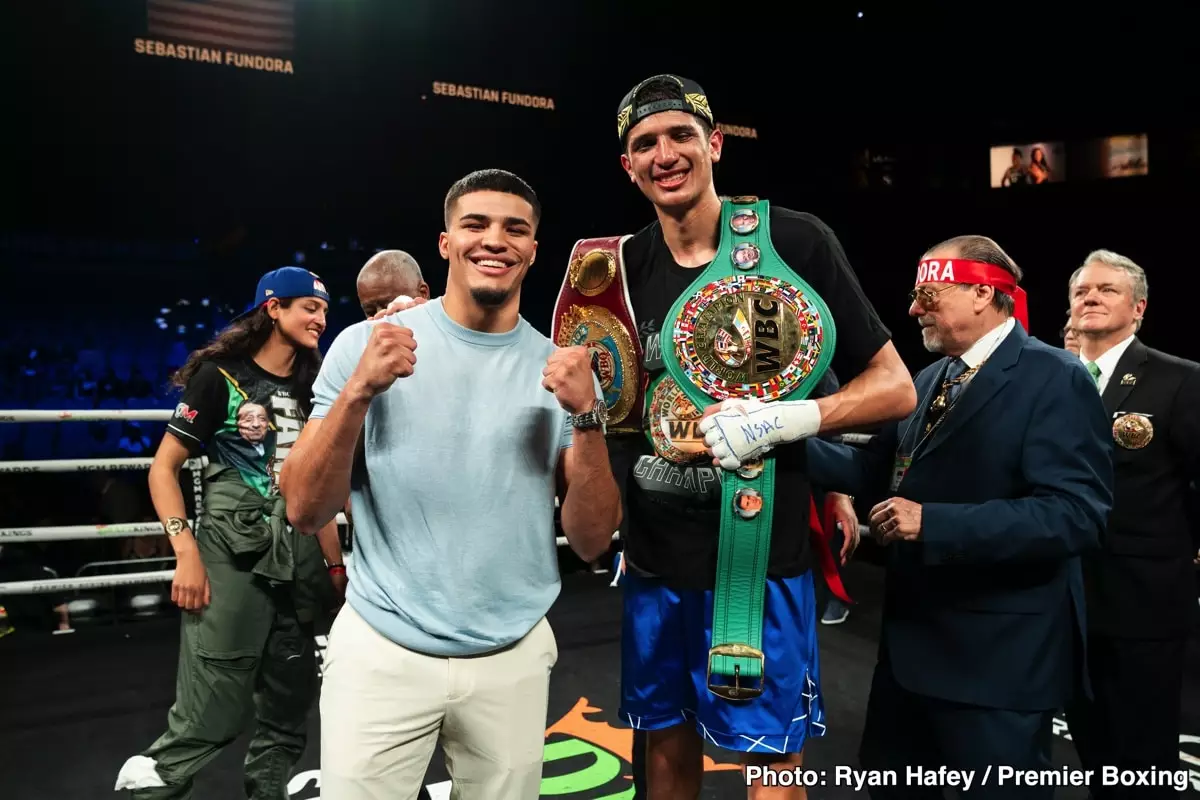Xander Zayas, the rising star in the junior middleweight division, recently made headlines after his attempts to engage WBC and WBO champion Sebastian Fundora. Fresh off a win against Chordale Booker via technical knockout, Zayas entered Fundora’s dressing room under the impression that aggressive promotion would lead to a future showdown. However, what ensued was a sharp reminder of the realities of professional boxing—a sport often driven by financial incentives more than mere ambition or desire for glory.
In a world where fighters rely as much on marketability as on skill, Zayas’s proactive approach could be seen as both courageous and ill-timed. He was bold, and indeed, it takes guts to approach a champion directly. Sadly, Zayas’s ambition appears to have backfired in a sport where timing and strategic negotiations hold as much weight as physical prowess inside the ring.
The Pulse of Boxing Economics
What Zayas failed to account for is that Fundora and his promoter prioritize fiscal gain above all else. The reality of boxing economics reared its head promptly, showing that while Zayas is hot on the heels of becoming a household name, he still lingers largely within the realm of hardcore fans and niche audiences. As further emphasized by Fundora’s camp, Zayas might not yet be a financially enticing opponent due to a lack of widespread recognition beyond dedicated boxing aficionados.
Fundora, often referred to as ‘The Towering Inferno,’ had the opportunity to make a statement by facing Zayas, but he chose to explore more lucrative options. This highlights an uncomfortable truth for rising stars like Zayas: visibility and public appeal can often define a fighter’s journey far more than talent alone. In an era where pay-per-view stars command premium dollars, promotional strategies must align not only with skill but also with branding potential.
The WBO’s Role and Future Challenges
The World Boxing Organization’s insistence on a title defense within 120 days for Fundora adds another layer to the narrative, creating a framework wherein champions must either comply or risk losing their titles. For Zayas, this could create mounting pressure on Fundora, but it also reveals a loophole in the current title regulation system. Zayas may have won his position through a controlled environment against an unranked opponent, casting a shadow of doubt on the legitimacy of his mandatory contender status.
Boxing is a sport steeped in tradition, and as such, regulations can sometimes feel rigid and unyielding, often leaving a room for conversation about fairness. Rather than a grueling battle, Zayas’s elevation to mandatory could easily be seen as an issue of convenience for the organization itself, effectively sidelining contenders who may have faced tougher opposition to earn their spot.
A Call for Change
Zayas expressed his disappointment and frustration in the post-fight aftermath, underscoring a fundamental truth—desire alone does not guarantee opportunity in the boxing landscape. He stated his identification as the mandatory challenger should warrant respect and consideration from the champion’s camp. But the realities of promotion and negotiation are far more complicated, often leading to an agonizing waiting game for ambitious fighters.
This situation begs the question: when will the system favor merit over marketability? As it stands, the sport of boxing often resembles an elaborate chess game, where financial outcomes dictate the moves rather than the raw talent of its players. Is it time for a reevaluation of how mandatory challenger statuses are assigned and honored? For fighters like Zayas who are prepared to put in the work, the pathway to success must remain clear and accessible, without undue barriers erected by the financial dynamics of the sport.
While Zayas may be momentarily stalled, the essence of boxing lies in its unpredictability. As champions weigh their options within a taut landscape, the ambitions of hungry challengers like Zayas will inevitably play a part in shaping the future. The quest for greatness, while multi-faceted, should not be lost in the complexities of commercial interests. Therein lies hope for a better balance between ambition and opportunity in boxing’s ever-evolving arena.

